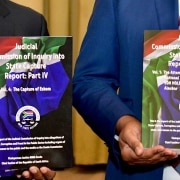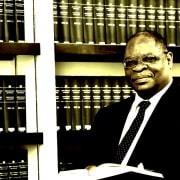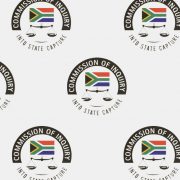|
Getting your Trinity Audio player ready...
|
Controversial facilities management company Bosasa spent between R4-million and R6-million monthly for bribes to senior government officials on the company’s payroll, in what CEO Gavin Watson called “monopoly money”. These were the words of Angelo Agrizzi, the former chief operations officer of Bosasa, and first witness to testify before the Zondo commission of inquiry into state capture this year. This was happening during a period when the company’s government contracts amounted to over R1-billion per annum.
Agrizzi referred to himself as Watson’s former “right hand man” and the one given the task of financial record keeping, secured in a vault called “Gavin’s safe” by staff. By the end of his first day of testimony, Agrizzi had made one damning allegation after another, pointing fingers at some powerful individuals whom he said received bribes and other favours from the company for tenders awarded.
Watson would openly give bags of money to different officials at Bosasa to facilitate bribes to those public officials with whom they associated on various projects they managed for government. “There was a vault at the office that we called ‘Gavin’s safe’, and often people would ask him for money and he would simply go in there and retrieve a money bag to give to them.” It happened in front of him, said Agrizzi, and other directors and senior managers at Bosasa were familiar with the practice.
Among the public entities with senior managers on Bosasa’s payroll, were the South African Post Office (Sapo) and the Airports Company of South Africa (Acsa). Former Sapo CEO Maanda Manyatshe, said Agrizzi, received gifts from himself and then Bosasa head of security Joe Gumede, following a trip the pair had taken to Dubai on business. Sapo’s head of security at the time, Siviwe Mapisa – the brother of the current minister of defence Nosiziviwe Mapisa-Nqakula – also received gifts following the trip. Bosasa, Agrizzi said, had obtained a security tender from Sapo through which they serviced several of their outlets, some of which operated as pension paypoints. Although he would not be drawn to say for sure if Manyatshe was influential in the process through which Bosasa obtained the contract, he was aware of the numerous occasions on which Manyatshe would receive gifts from Bosasa.
Even before the company became known as Bosasa, it had already become involved in dodgy practices. Agrizzi told the inquiry that the Chemical, Energy, Paper, Printing, Wood and Allied Workers Union (Ceppwawu) general secretary Simon Mofokeng would receive groceries valued at about R15 000 monthly from the company, then known as Dyambu. This was for his role in a tender the company had bid for, and won, with Sasol’s mining division. Agrizzi had gone to meet a procurement official at Sasol, on the instruction of Watson, soon after he joined the company in 1999. The purpose of the meeting, which seemed pre-arranged, was for Dyambu to be given an opportunity to rectify costing errors in the tender documentation it had submitted to Sasol. The new costing figures had been provided by Mofokeng. The tender was for catering services at a Sasol mining facility. With the corrected figures incorporated, Dyambu won the tender, despite the meeting having happened after the closing date.
“The official was visibly irritated, because they were only doing this because of orders from above,” Agrizzi said. As for Ceppwawu, it was singled out because it was the union with influence at Sasol at the time. Standard practice for Dyambu was to identify a union leader who would mobilise members to destabilise operations at a facility, while demanding the services of a particular service provider (in this case Dyambu), and therefore strong-arming the employer into submission.







